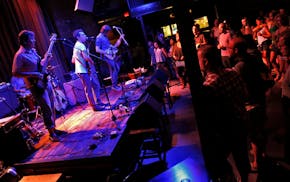In the latest sign of concern over possible trouble on the streets during the Republican National Convention, a special unit of the U.S. Justice Department is offering counseling services to protest groups and local police.
St. Paul police have accepted the offer, and seven officers will train with the federal experts Wednesday morning, but so far protesters are wary.
Two protest groups that were invited to a separate session Wednesday night by the federal Community Relations Service said they won't participate.
"Our movement does not have faith in anything that comes out of the administration," said Cheri Honkala, national organizer of the Poor People's Economic Human Rights Campaign, which is planning a "poor people's march" on the Xcel Energy Center on Sept. 2.
St. Paul police have expressed concerns about an assortment of groups that have vowed on websites to "shut down" the convention by blockading roads and preventing buses from reaching the Xcel.
Tom Walsh, a police spokesman, said police supported the efforts of the Community Relations Service. "They have a good track record, and we are making efforts to make sure there is good dialogue," he said.
Dates to '64 rights act
Kenith Bergeron, a senior conciliations specialist with the Justice Department group, said it was created by the 1964 Civil Rights Act to deal with issues regarding race, color and national origin. "We were created to prevent and resolve racial and ethnic tensions, incidents and civil disorder," he said.
In addition to talking to police, he said, his group wants to teach the protest organizations to "self-marshal themselves" during their demonstrations.
"We don't investigate, we don't assess blame and we keep things confidential," he said. "We are there to assist [the protest groups] to make sure the convention protest marches are done safely without any conflicts and disorder."
Honkala said she had a phone conversation in early July with Bergeron, who told her he was concerned about violence toward her and other marchers and said it was based on intelligence.
She said that when she asked who would be violent, "He said he was concerned about counterdemonstrations and also the recent buy by the [St. Paul] police department of Tasers."
Honkala said that she has 25 years of experience organizing demonstrations and that after consulting with her executive committee, she told Bergeron "basically thanks, but no thanks, our group has a history of nonviolence." She said she was "floored" by Bergeron's response. "He began screaming against me," she said.
Bergeron denies he screamed at her and says he said nothing about the purchase of Tasers or counterdemonstrators.
Because discussions are confidential, he said, he could not disclose the conversation.
Another group, the Welfare Rights Committee, was also invited to the Wednesday night session. Deb Konechne, a member of the group, said it has decided not to participate. She said the group plans to participate in a Sept. 1 antiwar march and the Sept. 2 march.
She said the federal officials should be inside the convention dealing with people perpetrating the violence and the Iraq war, "not those of who are speaking out against the war outside the convention."
Nathaniel Khaliq, president of the St. Paul NAACP, said he and two local ministers met with Bergeron and his immediate supervisor three weeks ago.
Khaliq said that he does not "have any high regard for the Justice Department" but that Bergeron and his mediation unit had been "very helpful" in working out an agreement between the city, and the NAACP and other community groups.
"From our experience it was very fruitful and beneficial to the community and the city of St. Paul," he said.
Bergeron hasn't contacted the coalition behind the Sept. 1 march because it evidently falls outside his unit's focus on race.
Randy Furst • 612-673-7382

12 gorgeous new picture books for children this spring
Metro Transit steps up safety efforts with monitors displaying bus behavior for all to see
What we know about the Sen. Nicole Mitchell burglary allegations so far
Man shot by deputy in Montrose allegedly said during earlier clash he'd rather die than be arrested
